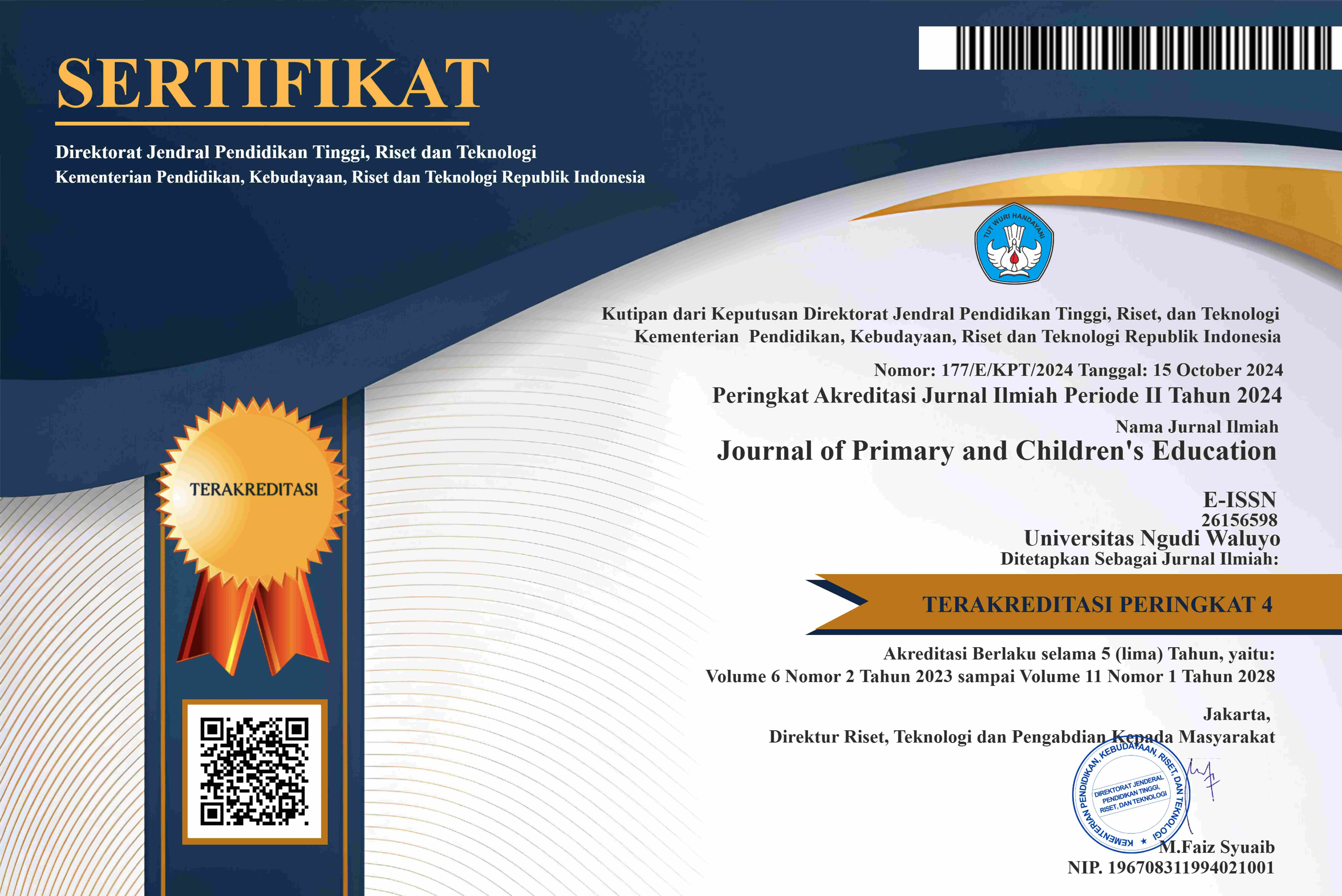KEPALA MADRASAH SEBAGAI PEMIMPIN (LEADER) PENDIDIKAN
DOI:
https://doi.org/10.35473/jnctt.v5i2.1901Abstract
Abstract
ÂLeadership is the ability to exert a constructive influence on others to make cooperative efforts to achieve planned goals. As a madrasah education leader, a madrasah head organizes the madrasa and the personnel who work in it into an efficient, democratic, and institutional cooperative situation that depends on the expertise of the workers. Under his leadership, educational programs for students had to be planned, organized and organized.
ÂKeyword: Head of Madrasah, Education Leader
References
Adair John, 1993, Membina Calon Pemimpin, Jakarta: Bumi Aksara
Arifin, Imron.1998; Kepemimpinan Kepala Sekolah, Desertasi, IKIP Malang.
Bangun Wilson, 2008, Intisari Manajemen, Bandung: PT Refika Aditama
Buhler Patricia, 2007, Alpha Teach Yourself Management Skills, Jakarta: Prenada
Dwiwibawa F. Rudy dan Riyanto Theo, 2008, Siap JadiPemimpin? Latihan Dasar Kepemimpinan, Yogyakarta: Kanisius
Barry Cushway & Derek Lodge,1999; Organisational Behavior and Design, 1993. Alih Bahasa, Sularno Tjiptowardojo, Perilaku Organisasi, Jakarta, PT. Gramedia.
Beeby, C.E, 1981; Pendidikan di Indonesia, Penilaian Pedoman Perencanaan, terj. BP3K Jakarta: LP3ES.
Bufort, James A, Athur, 1988; Managemen in Extention, Albana, Auburn University.
Carver, fred D, and Thomas Sergiovasi, Organization and Human Behavior Focus on School, New York; McGraw-Hill Book Company.
Chung, Kee H. & Mangginson, 1981; Organization Behavior Developing Managerial Skills, New York; Harper & Row Publisher.
Dirawat, Busro I dan Indra Fachrudi S. 1983; Pengantar Kepemimpinan Pendidikan, Surabaya: Usaha Nasional.
Fiedler, Fred. E.A. 1967; Theory of Leadership Effectiveness, New York: McGraw-Hill Book Company.
Gordon Thomas, 1997, MPE Menjadi Pemimpin Efektif, Jakarta: PT Gramedia Pustaka Utama
Glicman, C.D. 1981; Developmental Supervition, Alexanderia Virginia: ASCD.
Gribbin, James J. 1972; Efective Managerial Leadership, AMA, Inc.
Indrafachrudi Soekarto, 2006, Bagaimana Memimpin Sekolah Yang Efektif, Bogor: Ghalia Indonesia
Kartini Kartono, 2003, Pemimpin dan Kepemimpinan, Jakarta: Rajawali Pers
Komariah Aan dan Triatna Cepi, 2005 Visionary Leadership Menuju Sekolah Efektif, Jakarta: Bumi Aksara
Mulyono, 2009,Educational Leadership, Malang: UIN Malang Press
Mar’at, 1985, Pemimpin dan Kepemimpinan, Jakarta: Ghalia Indonesia
Nawawi Hadari dan Hadari M. Martini, 2006, Kepemimpinan Yang Efektif, Yogyakarta: Gadjah Mada University Press
Miftah Thoha, 1999; Kepemimpinan Dalam Manajemen, suatu Pendekatan Perilaku, Cet ke: 7, Jakarta, PT. RajaGrafindo Persada.
Muhaimin, 1998; Potret Paradigma Pengembangan Pendidikan Islam di Indonesia, Jurnal, STAIN Malang, edisi, no. 5.
R. Terry George, 2006, Prinsip-Prinsip Manajemen, Jakarta: Bumi Aksara
Riberu J., 1992, Dasar-Dasar Kepemimpinan, Jakarta: Pedoman Ilmu Jaya
Rivai Veithzal, 2009, Islamic Leadership, Jakarta: Bumi Aksara
Sahertian Piet. A. dan Sahertian Ida Aleida, 1987, Model Latihan Kepemimpinan, Surabaya: Usaha Nasional
Siswanto H.B., 2005, Pengantar Manajemen, Jakartra: bumi Aksara
Tim Dosen Administrasi Pendidikan Universitas Pendidikan Indonesia, 2009, Manajemen Pendidikan, Bandung: Alfabeta.
Tilaar, H.A.R, 1999; Manajemen Pendidikan Nasional, Bandung, Remaja Roesdakarya,
Yukl Gary, 2005, Kepemimpinan Dalam Organisasi, terj., Budi Supriyanto, Jakarta: Indeks.
Published
How to Cite
Issue
Section
License
Copyright notice:
- Authors retain copyright and grant the journal right of first publication with the work simultaneously licensed under Creative Commons Attribution License that allows others to share the work with an acknowledgement of the work's authorship and initial publication in this journal.
- Authors are able to enter into separate, additional contractual arrangements for the non-exclusive distribution of the journal's published version of the work (e.g., post it to an institutional repository or publish it in a book), with an acknowledgement of its initial publication in this journal.
- Authors are permitted and encouraged to post their work online (e.g., in institutional repositories or on their website) prior to and during the submission process, as it can lead to productive exchanges, as well as earlier and greater citation of published work (The Effect of Open Access)







